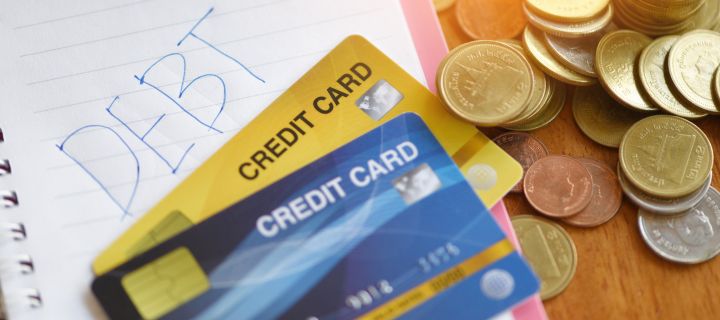
Millions of people in the UK are struggling with credit card debt. However, this type of debt is your worst financial enemy. Some helpful advice on managing this type of debt is available online, which we’ve summarised in a guide.
“27 million people in the UK have debts, with five million owing more than £10,000 in loans and credit.”
Money.co.uk research
The credit card debt trap
In today’s modern world, it’s all too easy for people to accumulate large credit card debts. In a society where credit is almost encouraged, it can be hard to ignore 0% deals when you’re paying interest on your existing cards. But when the 0% interest deal runs out, this can lead to a debt spiral, where your debts get even higher.
It’s thought that between 35-40% of adults in the UK use credit cards to pay household bills (Money.co.uk). If the credit card is paid off in full each month, this approach is unlikely to cause any harm. But if you are someone who moves their credit card debt around from one deal to the next, this can be a dangerous strategy. Eventually, if you don’t pay off your credit cards and the debt increases, you could be in a debt cycle.
A well-managed credit card involves planned spend and the ability to pay off the card quickly if needed. Ideally, you would stay 30% below your credit card limit on average, and the interest rate would be as low as possible. Any spending would be mindful and planned.
A poorly managed credit card tends to mean your debt is far higher than your total savings and there is little planning or budgeting. You are likely to use credit cards as a ‘financial crutch’ on a regular basis, and at least one card might have a high-interest rate. If you’re unable to pay off the card at any time soon, this could become a big problem.
How to avoid credit card debt
Below are some more tips to help you plan your spending so you don’t fall into a debt trap:
- Create a budget – list all your monthly outgoings on a spreadsheet and subtract these from your income to work out the amount of money remaining. Total this amount and x 12, then subtract any upcoming big spends. This will give you a realistic financial budget for the year ahead.
- Check your credit card terms – your aim should be to pay off at least one of your cards, starting with the one with the highest rate of interest. Check when any 0% deals come to an end. If necessary, transfer the debt to a card with a lower interest rate, but treat this as a temporary solution. Your aim should be to pay this debt off.
- Talk to your bank – if you are worried about using credit cards, you might be able to negotiate a temporary bank overdraft. This can help to pay off any imminent debts.
- Consolidate your debts – depending on your situation, you could consolidate multiple credit card debts into a single bank loan. Always check the loan interest rate before proceeding. It’s advisable to stop using credit cards until the loan has been paid off.
Why is credit card debt bad?
Below are three scenarios that can happen when you lose control over your credit card debt:
- Bad Credit Score – everyone has a credit score, which is based on your reliability when it comes to repaying your debts. When you amass a large amount of debt and struggle to pay this off, this causes your rating to deteriorate. A bad credit score could lead to you being refused credit and unable to get a loan or a mortgage.
- Individual Voluntary Arrangements (IVAs) – if you cannot pay your credit card debts, you could consider an IVA. This legally binding agreement between you and your creditors consists of a debt repayment plan. Any interest is stopped and, as it’s approved by the court, your creditors are not allowed to chase you.
- Bankruptcy – this is the worst-case scenario and has serious repercussions; it could result in you losing your home and any valuable possessions to pay off debt. This is when your debts are higher than the assets you own, and you don’t have the ability to pay your debts. Usually, bankruptcy lasts for 12 months – your creditors cannot contact you or take you to court during this time.
Debt management support
If you’re struggling to pay off large credit card debts, below are some support organisations:
- Citizens Advice has been providing debt advice for decades. They have a Debt Adviser service, who can advise you on debt management. Learn more…
- StepChange is an independent not-for-profit organisation that provides a debt advice service. Their experts can help you find a solution for debt problems. Learn more…
- Money Helper is a service provided by the government’s Money & Pensions Service. They offer advice on budgeting and an online helpline. Learn more…
The stress of owing big sums of money can take its toll and large debts can seriously impact your mental health. So, it’s important to make sure you have adequate support for your wellbeing too. Below are a couple of mental health helplines:
- Samaritans – Phone: 116 123 (Monday to Sunday, accessible at any time).
- Shout – Text ‘SHOUT’ to 85258 for free. This will start a confidential and anonymous conversation with a trained volunteer.
Your Financial Advisor in Nottingham and Lincoln
At Balance: Wealth Planning, we understand the stress and worry caused by debt. Due to the high cost of living, more people than ever are relying on credit cards to pay bills. If you are worried that you are losing control of your finances, it’s worth having a review.
For a financial planning review, get in touch with our team.
Sources:
https://www.unbiased.co.uk/discover/personal-finance/budgeting/take-control-of-credit-card-debt
https://www.experian.co.uk/consumer/guides/bad-credit-score.html
https://www.stepchange.org/about-us/what-we-do.aspx
https://www.moneyhelper.org.uk/

